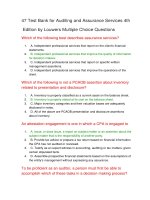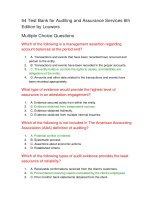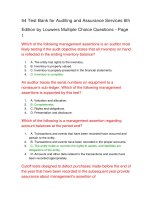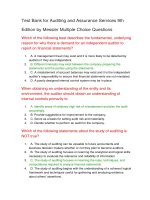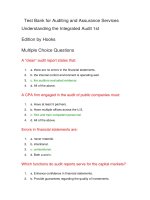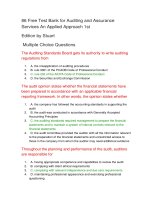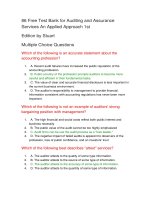Test bank for auditing and assurance services 9th
Bạn đang xem bản rút gọn của tài liệu. Xem và tải ngay bản đầy đủ của tài liệu tại đây (40.98 KB, 10 trang )
Test Bank for Auditing and Assurance Services 9th
Edition by Messier Multiple Choice Questions
Which of the following best describes the fundamental, underlying
reason for why there is demand for an independent auditor to
report on financial statements?
1.
A. A management fraud may exist and it is more likely to be detected by
auditors if they are independent.
2. B. Different interests may exist between the company preparing the
statements and the parties using the statements.
3. C. A misstatement of account balances may exist and it is the independent
auditor's responsibility to ensure that financial statements are not misstated.
4. D. A poorly designed internal control system may be in place.
When obtaining an understanding of the entity and its
environment, the auditor should obtain an understanding of
internal controls primarily to
1.
A. Identify areas of relatively high risk of misstatement and plan the audit
accordingly.
2. B. Provide suggestions for improvement to the company.
3. C. Serve as a basis for setting audit risk and materiality.
4. D. Decide whether to perform an audit for the company.
Which of the following statements about the study of auditing is
NOT true?
1.
A. The study of auditing can be valuable to future accountants and
business decision makers whether or not they plan to become auditors.
2. B. The study of auditing focuses on learning the analytical and logical skills
necessary to evaluate the relevance and reliability of information.
3. C. The study of auditing focuses on learning the rules, techniques, and
computations required to analyze financial statements.
4. D. The study of auditing begins with the understanding of a coherent logical
framework and techniques useful for gathering and analyzing evidence
about others' assertions.
Why do auditors generally use a sampling approach to evidence
gathering?
1.
A. Auditors are experts and do not need to look at much to know whether
the financial statements are correct or not.
2. B. Auditors must balance the cost of the audit with the need for precision.
3. C. Auditors must limit their exposure to their auditee to maintain
independence.
4.
D. The auditor's relationship with the auditee is generally adversarial, so the
auditor will not have access to all of the financial information of the company.
Which of the following would best be described as an assurance
service?
1.
2.
A. Preparing a report representing a client's position during an IRS audit.
B. Working with a company to develop a more efficient method of
processing financial transactions.
3. C. Offering an opinion concerning the accuracy of statements made on an
entity's website relating to its online privacy policies.
4. D. Assisting a company in identifying potential sources of capital for
potential acquisitions.
Which of the following is not a concept that is included in the
scope paragraph of the auditor's report?
1.
A. The conformance of the financial statements with generally accepted
accounting principles.
2. B. The audit was conducted in accordance with applicable auditing
standards.
3. C. The audit was planned and performed to obtain reasonable, rather than
absolute, assurance.
4. D. An audit involves examining items on a test (i.e. sampling) basis.
Auditors are most likely to use the most rigorous audit procedures
to examine
1.
2.
3.
4.
A. Routine transactions.
B. Management assertions that are deemed to be of low risk.
C. Only the rights and obligations assertion.
D. Management assertions that are deemed to be of high risk.
Which of the following is true with respect to the auditor's report?
1.
A. The report indicates that the company's financial statements were
audited in accordance with generally accepted accounting standards.
2. B. The report indicates that the company's financial statements were
audited in accordance with applicable auditing standards.
3. C. The report indicates that the company's financial statements were
audited in accordance with the auditor's best judgment.
4. D. The report indicates that the company's financial statements were
audited in accordance with statements issued by the FASB.
Auditing is defined as a "systematic process of objectively
obtaining and evaluating evidence regarding assertions..." What
is meant by "systematic process"?
1.
2.
A. All audits involve obtaining the same evidence.
B. All audits involve evaluating evidence in the same manner.
3.
C. There should be a well-planned approach for obtaining and evaluating
evidence.
4. D. All assertions are equally important for all audits.
An auditor would issue an adverse opinion if
1.
A. The auditor encounters adverse attitudes toward the auditor on the part
of company management.
2. B. A qualified opinion cannot be given because the auditor is not qualified to
do so.
3. C. An immaterial misstatement is present.
4. D. The statements taken as a whole do not fairly present the financial
condition and results of operations of the company.
Before accepting an engagement to audit a new entity, an auditor
is required to
1.
2.
A. Make inquiries of the predecessor auditor.
B. Tell the company whether or not the auditor is willing to issue a "clean"
opinion.
3. C. Prepare a memorandum setting forth the staffing requirements and
documenting the preliminary audit plan.
4. D. Become a member of the entity's board of directors.
For publicly-held companies, which of the following is integrated
into the audit of financial statements?
1.
2.
3.
4.
A. Budgetary information audit.
B. The audit of internal controls.
C. Audit of management forecasts.
D. Audit of interim financial statements.
Which of the following statements best describes a relationship
between sample size and other elements of auditing?
1.
2.
3.
4.
A. If materiality increases, so will the sample size.
B. If the desired level of assurance increases, sample sizes can be smaller.
C. If materiality decreases, sample size will need to increase.
D. There is no relationship between sample size and materiality or the
desired level of assurance.
Which of the following best describes why publicly-traded
corporations follow the practice of having the external auditor
appointed by the board of directors or elected by the
stockholders?
1.
A. To promote an adversarial relationship between the auditor and the
corporation's management.
2. B. To enhance auditor independence from the management of the
corporation.
3.
4.
C. To encourage a policy of rotation of the independent auditors.
D. To give management more leverage over the auditor's decisions.
Which of the following best describes why an independent auditor
is asked to express an opinion on the fair presentation of financial
statements?
1.
A. It is difficult to prepare financial statements that fairly present a
company's financial position and changes in cash flows without the expertise
of an independent auditor.
2. B. It is management's responsibility to seek available independent aid in the
appraisal of the financial information shown in its financial statements.
3. C. The opinion of an independent party is needed because a company is
not likely to be considered objective with respect to its own financial
statements.
4. D. It is a customary courtesy that all stockholders of a company receive an
independent report on management's stewardship in managing the affairs of
the business.
During the first phase of an audit, a CPA most likely would
1.
2.
3.
4.
A. Identify specific internal control activities that are likely to prevent fraud.
B. Evaluate the reasonableness of the company's accounting estimates.
C. Evaluate the integrity of management.
D. Inquire of the company's attorney as to whether any unrecorded claims
are probable or asserted.
Which of the following best describes the concept of audit risk?
1.
A. The risk of the auditor being sued because of association with an
auditee.
2. B. The risk that the auditor will provide an unqualified opinion on financial
statements that are, in fact, materially misstated.
3. C. The overall risk that a material misstatement exists in the financial
statements.
4. D. The risk that auditors use audit procedures that are inappropriate.
Evidence is reliable if it
1.
2.
3.
4.
A. Signals the true state of a management assertion.
B. Applies to the period being audited.
C. Relates to the audit assertion being tested.
D. Is consistent with management's assertions.
An investor is reading the financial statements of the Stankey
Corporation and observes that the statements are accompanied
by an auditor's unqualified report. From this, the investor may
conclude that
1.
A. Any disputes over significant accounting issues have been settled to the
auditor's satisfaction.
2.
3.
B. The auditor is satisfied that Stankey will be highly profitable in the future.
C. The auditor is certain that Stankey's financial statements have been
prepared accurately and that all account balances are precisely correct.
4. D. The auditor has determined that Stankey's management is not qualified
to lead the company.
In the context of agency theory, information asymmetry refers to
the idea that
1.
2.
3.
A. Information can vary in its reliability.
B. Information can vary in its relevance.
C. Management has more information about the entity's true financial
position than do the absentee owners (i.e. stockholders).
4. D. Management likely will not act in the best interests of the absentee
owners.
The basic purpose of a financial statement audit is to
1.
2.
A. Detect fraud.
B. Examine individual transactions so that the auditor may certify as to their
validity.
3. C. Provide assurance regarding whether the auditee's financial statements
are fairly stated.
4. D. Assure the consistent application of correct accounting procedures.
Assurance services may improve all of the following except
1.
2.
3.
4.
A. Relevance.
B. Credibility.
C. Periodicity.
D. Reliability.
Which of the following statements is not true with respect to
assurance, attest, and audit services?
1.
A. These services are applied only to financial statements and financial
statement accounts.
2. B. These services all involve obtaining and evaluating evidence.
3. C. These services all involve determining the correspondence of some
information to a set of criteria.
4. D. These services all involve issuing a report.
Which one of the following statements best describes the concept
of materiality?
1.
A. Materiality is determined by reference to specific quantitative guidelines
established by the AICPA.
2. B. Materiality depends only on the dollar amount of an item relative to other
items in the financial statements.
3. C. Materiality depends on the nature of an item but not on the dollar amount
of the item.
4.
D. Materiality is largely a matter of professional judgment.
Preliminary engagement activities include
1.
2.
3.
4.
A. Evaluating internal controls.
B. Assessing audit risk at the account balance level.
C. Setting materiality.
D. Performing background checks on top management.
An auditor who accepts an audit engagement and does not
possess expertise with respect to the business entity's industry,
should
1.
2.
A. Engage financial experts familiar with the nature of the business entity.
B. Obtain a knowledge of matters that relate to the nature of the entity's
business.
3. C. Refer a substantial portion of the audit to another CPA, who will act as
the principal auditor.
4. D. First inform management that an unqualified opinion cannot be issued.
The auditor's report is generally addressed to the
1.
2.
3.
4.
A. Chief operating officer.
B. Securities and Exchange Commission.
C. Stockholders of the company.
D. Chief financial officer.
24 Free Test Bank for Accounting Information Systems
1st Edition by Richardson Multiple Choice Questions
A supply chain system does not include information about
1.
2.
3.
4.
A. Current customers
B. Prospective customers
C. Availability of inventory
D. Current suppliers
According to a recent study, the informate-up IT strategic role is
defined as systems that:
1.
2.
3.
4.
A. replacing human labor in automating business processes
B. provides information about business activities to all employees
C. provide information about business activities to senior management
D. fundamentally redefine business processes and relationships
Which designation would most appropriate for those professionals
possessing an IT audit, control and security skills?
1.
2.
A. Certified Internal Auditor (CIA)
B. Certified Public Accountant (CPA)
3.
4.
C. Certified Information Technology Professional (CITP)
D. Certified Information Systems Auditors (CISA)
A supply chain:
1.
2.
3.
4.
A. Refers to the supplies needed to build products
B. Refers to the flow of materials, information, payments and services.
C. Is similar in function and purpose to the value chain
D. Does not apply to a service firm like an accounting firm.
According to a recent study, the transform IT strategic role is
defined as systems that:
1.
2.
3.
4.
A. replacing human labor in automating business processes
B. provides information about business activities to all employees
C. provide information about business activities to senior management
D. fundamentally redefine business processes and relationships
An example of an AIS that primarily addresses internal business
processes includes:
1.
2.
3.
4.
A. Supply chain software
B. Customer relationship management software
C. B2B transaction software
D. Enterprise systems
Customer Relationship Management is defined as:
1.
A. A system used to manage and nurture a firm's interactions with its
current and potential customers
2. B. A system used to track a customer's past purchases
3. C. A system used to connect a firm's suppliers with a firm's customers.
4. D. A system used to advertise current items on sale to customers.
Business Value is defined as:
1.
2.
A. The monetary value of a business.
B. Items, events and interactions that determine the financial health and
well-being of the firm
3. C. The cost to acquire a business by an outsider.
4. D. The overall value of taking data and transforming it in to information
needed for decision making.
Which of the following are not a characteristic of useful
information?
1.
2.
3.
4.
A. Easy to understand
B. Feedback value.
C. Timely
D. Representational Faithfulness
Which of the following are considered to be mandatory
information required by a regulatory body?
1.
2.
3.
4.
A. Financial reports for the Securities and Exchange Commission
B. The amount of taxes saved by a merger
C. The total dollar value of fireworks that are sold on July 4.
D. The cost to build an all-new Starbucks restaurant in Abu Dhabi.
The Information Value Chain is defined as:
1.
2.
A. The flow of materials, information, payments, and services
B. The use of computer technology to provide information about business
activities to employees across the firm.
3. C. The overall transformation of data from a business need to the ultimate
decision.
4. D. A centralized database that collects data from throughout the firm.
Activity-based costing is an example of:
1.
2.
3.
4.
A. Information overload
B. Mandatory information
C. Discretionary information
D. Enterprise System
Support activities in the value chain does not include:
1.
2.
3.
4.
A. Firm Infrastructure
B. Human Resource Management
C. Procurement
D. Accounting and Finance
The role of accountants in accounting information systems
include all except:
1.
2.
3.
4.
A. User
B. Manager
C. Operator
D. Evaluator
EBay uses information technology to sell goods on the internet.
This would be an example of the ___________ strategic role.
1.
2.
3.
4.
A. Automate
B. Informate - up
C. Transform
D. Informate - down
The income statement line item most likely affected by an AIS
investment in supply chain that would interface with suppliers
would be:
1.
2.
3.
4.
A. Revenues
B. Cost of Goods Sold
C. Selling, General and Administrative Expenses
D. Research and Development Expenses
The IT strategic roles of AIS investments are classified as:
1.
2.
3.
4.
A. Automate, Informate, Transform
B. Value creation, Value Destruction, Value Neutral
C. Digitize, Report, Transform
D. Automate, Digitize, Transport
The income statement line item most likely affected by an AIS
investment in enterprise systems would be:
1.
2.
3.
4.
A. Revenues
B. Cost of Goods Sold
C. Selling, General and Administrative Expenses
D. Unearned Revenue
Accounting information systems are:
1.
2.
3.
4.
A. Always computerized.
B. Report only accounting information.
C. Records, processes and reports
D. Are for computer games
Many hospitals and doctor's offices are beginning to digitize the
medical records of their patients. This is an example of the
____________ strategic role.
1.
2.
3.
4.
A. Automate
B. Informate - up
C. Transform
D. Informate - down
The income statement account most likely affected by an AIS
investment in customer relationship management (CRM) would
be:
1.
2.
3.
4.
A. Revenues
B. Cost of Goods Sold
C. Selling, General and Administrative Expenses
D. Unearned Revenue
The correct order of effects in the value chain are:
1.
2.
3.
4.
A. Inbound Logistics →
B. Inbound Logistics →
C. Inbound Logistics →
D. Inbound Logistics →
Operations → Service
Outbound Logistics → Marketing & Sales
Operations → Outbound Logistics
Operations → Shipping
Which designation is for CPAs with a broad range of technology
knowledge and experience?
1.
2.
3.
4.
A. Certified Internal Auditor (CIA)
B. Certified Public Accountant (CPA)
C. Certified Information Technology Professional (CITP)
D. Certified Information Systems Auditors (CISA)
A simple information system includes all but the following
elements except:
1.
2.
3.
4.
A. Processing
B. Storage
C. Input
D. Reporting
Total Points: 0 correct out


